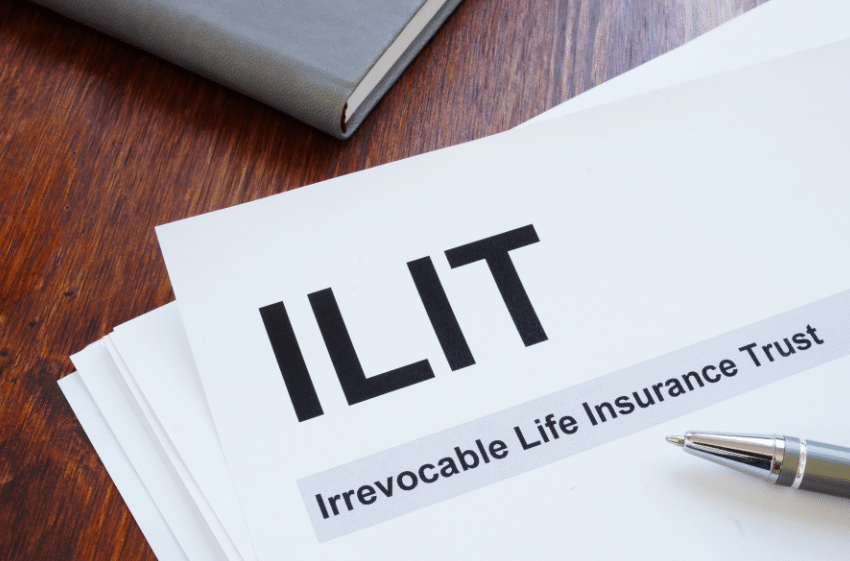An irrevocable life insurance trust (an “ILIT”) is a type of trust designed by its creator (the “grantor”) to own a life insurance policy. The grantor names an individual or professional trust company (the “trustee”) to manage the administration of the trust and distribution of the proceeds paid to the trust upon the insured’s death to/for the recipients the grantor selects (the “beneficiaries”).
There are several good reasons that one may establish an ILIT, but perhaps the biggest motivator to voluntarily pay an attorney a few thousand dollars to set up an extra trust is estate tax management. When you die, the value of all your assets (your “estate”) is determined, and if that value exceeds the estate tax exemption level for the year of your death, your estate will pay estate tax on the excess (currently at a 40% rate). At $12.92 Million, the 2023 exemption level is the highest it has ever been however, under current law, that exemption will be approximately halved at the end of 2025, leaving Americans with an exemption of somewhere in the $6.7-$6.8 million range.
Back in the days when there was a $600,000 estate tax exemption, everyone and their grandmother (literally!) had an ILIT to provide estate tax-free liquidity to ultimately pay for estate taxes. Times have certainly changed and many people believe that it doesn’t matter if the exemption is almost $13 million or six-ish, because the value of their estates will never approach the exemption levels. Many will be correct in this thinking; but be mindful of the fact that the value of an estate includes everything; the equity in your home, your retirement, investment, savings, checking and money market account(s), your personal items, your business interests, and so many other assets…including your life insurance. Yes, if you own an insurance policy insuring your life at the time of your death, the death benefit payable from that policy is considered when tallying up the value of your estate for estate tax calculation purposes. That’s a fast way to add one, two, three million or more to the value of your taxable estate. If a properly drawn and funded ILIT owns your life insurance policy at the time of your death, that means you don’t own it, which means that, if certain protocols have been followed in the administration of the ILIT, the life insurance policy is not included in the determination of your taxable estate.
Of course, there are many other good reasons to talk with your attorney about establishing an ILIT other than estate tax management, including:
- Even if your estate falls under the exemption, your beneficiaries may need cash for maintenance of illiquid assets, to pay income taxes associated with distributions from your IRA, or for other reasons.
- Your estate may need liquidity to fulfill your specific bequests.
- You may desire to limit or control how your heirs receive and/or spend life insurance proceeds, particularly if your beneficiaries are young.
- To manage the life insurance proceeds in a manner to prevent friction that may arise in blended families resulting from remarriages.
- To ensure that the receipt of benefits from your policy will not result in the disqualification of a beneficiary from the receipt of means-tested government benefits.
- To provide certain asset/creditor protection for the beneficiaries of your life insurance policy.
- To allow multiple generations of your family to benefit from the life insurance proceeds without having such proceeds count against their own taxable estates.
You may now be wondering why you would not set up an ILIT. Well, an ILIT is not without its drawbacks. First and foremost, the trust itself is irrevocable. You cannot change it. Yes, there are certain modern mechanisms that allow for modification of irrevocable trusts, but they are not without limitations, and if you are establishing an ILIT, it’s wise to do so with the frame of mind that it will never be changed. Additionally, if you have grand plans for using any of the cash value of your policy during your lifetime, an ILIT is probably not a great plan, as transferring your policy to an ILIT results in the loss of the policy for your personal use. Some people shudder at the necessary procedures for properly administering an ILIT (though, once they get used to it, most realize that it really isn’t a big deal). Of course there’s always the cost of the ILIT to add to the list of cons, as you will have to pay legal fees for the establishment of the trust, and you may need to pay accounting fees for the completion of a gift tax return if gifts are to be made to the trust (gifting is most commonly how premium payments for the life insurance policy are funded).
Generally, most people find that the substantial benefits afforded by the establishment of an ILIT far outweigh the drawbacks. There are precise rules to follow and important timing concerns relating to the establishment and funding of an ILIT, so the time to talk with your professional advisors about whether you need an ILIT and why is now.
If you have any questions or would like to discuss further, please reach out to your client service team, or call 404.264.1400. You can also visit us on the web at HomrichBerg.com.
Important Disclosures
This article may not be copied, reproduced, or distributed without Homrich Berg’s prior written consent.
All information is as of date above unless otherwise disclosed. The information is provided for informational purposes only and should not be considered a recommendation to purchase or sell any financial instrument, product or service sponsored by Homrich Berg or its affiliates or agents. The information does not represent legal, tax, accounting, or investment advice; recipients should consult their respective advisors regarding such matters. This material may not be suitable for all investors. Neither Homrich Berg, nor any affiliates, make any representation or warranty as to the accuracy or merit of this analysis for individual use. Information contained herein has been obtained from sources believed to be reliable but are not guaranteed. Investors are advised to consult with their investment professional about their specific financial needs and goals before making any investment decision.
©2023 Homrich Berg.


